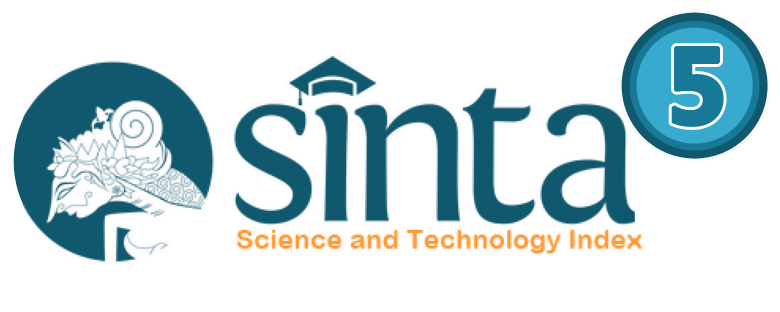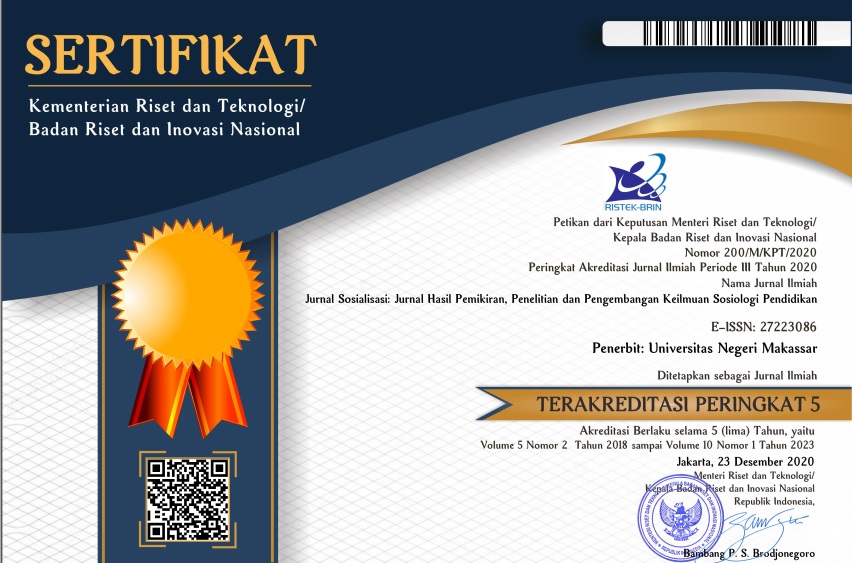PENGARUH TIPE KEPRIBADIAN DAN LINGKUNGAN KELUARGA TERHADAP KEMAMPUAN INTERAKSI SOSIAL MAHASISWA
(1) Universitas Sebelas Maret
(2) Universitas Sebelas Maret
(*) Corresponding Author
DOI: https://doi.org/10.26858/sosialisasi.v1i1.26740
Abstract
This study aims to explain the effect of introverted extrovert personality type on students' social interaction skills. The research sample was 121 students in one of the university in East Java. Data were obtained using a questionnaire with variable measurements using a Likert scale. The data analysis technique used multiple regression. The results showed that there was no influence of personality type on students' social interaction skills. Meanwhile, there is a significant positive effect of the family environment on students' social interaction skills. Based on the results of the R2 test of 36%, which means that students' social interaction skills can be explained by the variables of personality type and family environment.
Keywords
Full Text:
PDFReferences
Cook, K. S. (2015). Exchange: Social. In International Encyclopedia of the Social & Behavioral Sciences: Second Edition (Second Edi, Vol. 8). Elsevier. https://doi.org/10.1016/B978-0-08-097086-8.32056-6
Eysenck, S. B. G., Barrett, P. T., & Saklofske, D. H. (2021). The Junior Eysenck Personality Questionnaire. Personality and Individual Differences, 169(March 2020), 109974. https://doi.org/10.1016/j.paid.2020.109974
Fang, S., Huang, J., Wu, S., Jin, M., Kim, Y., & Henrichsen, C. (2020). Family assets, parental expectation, and child educational achievement in China: A validation of mediation analyses. Children and Youth Services Review, 112, 104875. https://doi.org/10.1016/j.childyouth.2020.104875
Farboodi, M., Jarosch, G., & Shimer, R. (2021). Internal and external effects of social distancing in a pandemic. In Journal of Economic Theory (Vol. 196). https://doi.org/10.1016/j.jet.2021.105293
Flores-Mendoza, C., Ardila, R., Gallegos, M., Braga, L. S., Santiago, B. M. C., & Andrade, D. M. (2016). Hans Eysenck in Latin America: His influence in the psychology, the study of personality and individual differences. Personality and Individual Differences, 103, 68–73. https://doi.org/10.1016/j.paid.2016.04.049
Indika, D. R., & Jovita, C. (2017). Media Sosial Instagram Sebagai Sarana Promosi Untuk Meningkatkan Minat Beli Konsumen. Jurnal Bisnis Terapan, 1(01), 25–32. https://doi.org/10.24123/jbt.v1i01.296
Janke, S., & Dickhäuser, O. (2019). A neglected tenet of achievement goal theory: Associations between life aspirations and achievement goal orientations. Personality and Individual Differences, 142(November 2018), 90–99. https://doi.org/10.1016/j.paid.2019.01.038
Kieschke, U., & Schaarschmidt, U. (2008). Professional commitment and health among teachers in Germany: A typological approach. Learning and Instruction, 18(5), 429–437. https://doi.org/10.1016/j.learninstruc.2008.06.005
Kokkinaki, A. I., Demoliou, C., & Iakovidou, M. (2015). Students’ perceptions of plagiarism and relevant policies in Cyprus. International Journal for Educational Integrity, 11(1), 1–11. https://doi.org/10.1007/s40979-015-0001-7
Kowalewska, D., Adamczyk, A., & Trojanowska–Strzęboszewska, M. (2021). Dataset of Ukrainian migrant workers opinions on their stay in Poland during COVID-19 lockdown. In Data in Brief (Vol. 38). https://doi.org/10.1016/j.dib.2021.107415
Lee, Y. M., Florez, E., Tariman, J., McCarter, S., & Riesche, L. (2015). Factors related to sexual behaviors and sexual education programs for Asian-American adolescents. Applied Nursing Research, 28(3), 222–228. https://doi.org/10.1016/j.apnr.2015.04.015
Manlove, J. S., Terry-Humen, E., Ikramullah, E. N., & Moore, K. A. (2006). The Role of Parent Religiosity in Teens’ Transitions to Sex and Contraception. Journal of Adolescent Health, 39(4), 578–587. https://doi.org/10.1016/j.jadohealth.2006.03.008
Martínez-Monteagudo, M. C., Delgado, B., Inglés, C. J., & García-Fernández, J. M. (2019). Cyberbullying in the university setting. Relationship with family environment and emotional intelligence. Computers in Human Behavior, 91(June 2018), 220–225. https://doi.org/10.1016/j.chb.2018.10.002
McLarnon, M. J. W., & Romero, E. F. (2020). Cross-cultural equivalence of shortened versions of the Eysenck Personality Questionnaire: An application of the alignment method. Personality and Individual Differences, 163(December 2019), 110074. https://doi.org/10.1016/j.paid.2020.110074
Netter, P., Hennig, J., & Munk, A. J. (2021). Principles and approaches in Hans Eysenck’s personality theory: Their renaissance and development in current neurochemical research on individual differences. Personality and Individual Differences, 169(November 2019), 109975. https://doi.org/10.1016/j.paid.2020.109975
Olokundun, M., Moses, C. L., Iyiola, O., Ibidunni, S., Ogbari, M., Peter, F., & Borishade, T. (2018). The effect of non traditional teaching methods in entrepreneurship education on students entrepreneurial interest and business startups: A data article. Data in Brief, 19, 16–20. https://doi.org/10.1016/j.dib.2018.04.142
Parsad, C., Prashar, S., Vijay, T. S., & Kumar, M. (2021). Do promotion and prevention focus influence impulse buying: The role of mood regulation, shopping values, and impulse buying tendency. Journal of Retailing and Consumer Services, 61(March), 102554. https://doi.org/10.1016/j.jretconser.2021.102554
Rahmadana, M. F., & Sagala, G. H. (2020). Economic resilience dataset in facing physical distancing during COVID-19 global pandemic. In Data in Brief (Vol. 32). https://doi.org/10.1016/j.dib.2020.106069
Sailer, K., & McCulloh, I. (2012). Social networks and spatial configuration-How office layouts drive social interaction. Social Networks, 34(1), 47–58. https://doi.org/10.1016/j.socnet.2011.05.005
Saklofske, D. H. (2020). Expression of concern: The cancer/coronary-heart-disease and personality publications in personality and individual differences, authored by professors R. Grossarth-Maticek and H.J. Eysenck. Personality and Individual Differences, 159(January), 109855. https://doi.org/10.1016/j.paid.2020.109855
Santosa, M. (2020). Analisis Dampak Pandemi Covid 19 Terhadap Perekonomian Lokal Dari Sudut Pandang Jenis Pekerjaan Dan Tingkat Daya Beli Masyarakat Di Jawa Tengah. PREPOTIF : Jurnal Kesehatan Masyarakat, 4(2), 253–267. https://doi.org/10.31004/prepotif.v4i2.978
Seginer, R., & Mahajna, S. (2015). On the meaning of higher education for transition to modernity youth: Lessons from future orientation research of Muslim girls in Israel. International Journal of Educational Research, 76, 112–119. https://doi.org/10.1016/j.ijer.2015.03.005
Sela, Y., Zach, M., Amichay-Hamburger, Y., Mishali, M., & Omer, H. (2020). Family environment and problematic internet use among adolescents: The mediating roles of depression and Fear of Missing Out. Computers in Human Behavior, 106(December 2019), 106226. https://doi.org/10.1016/j.chb.2019.106226
Siddiqui, N., & Gorard, S. (2017). Comparing government and private schools in Pakistan: The way forward for universal education. International Journal of Educational Research, 82, 159–169. https://doi.org/10.1016/j.ijer.2017.01.007
Staats, A. W., & Eifert, G. H. (1990). The paradigmatic behaviorism theory of emotions: Basis for unification. Clinical Psychology Review, 10(5), 539–566. https://doi.org/10.1016/0272-7358(90)90096-S
Sugiyono. (2012). Metodologi Penelitian Pendidikan (Pendekatan Kuantitatif, Kualitatif, dan R&D). Alfabeta.
Sugiyono. (2013a). Metode Penelitian Kuantitatif, Kualitatif, dan R&D (19th ed.). Alfabeta.
Sugiyono. (2013b). Metode Penelitian Pendidikan Pendekatan Kuantitatif, Kualitatif dan R&D. Alfabeta.
Tavakolizadeh, J., Abedizadeh, Z., & Panahi, M. (2012). The Effect of Swimming on Self Concept’s Girl High School Students. Procedia - Social and Behavioral Sciences, 69(Iceepsy), 1226–1233. https://doi.org/10.1016/j.sbspro.2012.12.055
Zanetta, L. D. A., Hakim, M. P., Gastaldi, G. B., Seabra, L. M. A. J., Rolim, P. M., Nascimento, L. G. P., Medeiros, C. O., & da Cunha, D. T. (2021). The use of food delivery apps during the COVID-19 pandemic in Brazil: The role of solidarity, perceived risk, and regional aspects. Food Research International, 149(August). https://doi.org/10.1016/j.foodres.2021.110671
Zilanawala, A., Sacker, A., & Kelly, Y. (2019). Internalising and externalising behaviour profiles across childhood: The consequences of changes in the family environment. Social Science and Medicine, 226(February), 207–216. https://doi.org/10.1016/j.socscimed.2019.02.048
Article Metrics
Abstract view : 292 times | PDF view : 73 timesRefbacks
- There are currently no refbacks.

This work is licensed under a Creative Commons Attribution 4.0 International License.


































